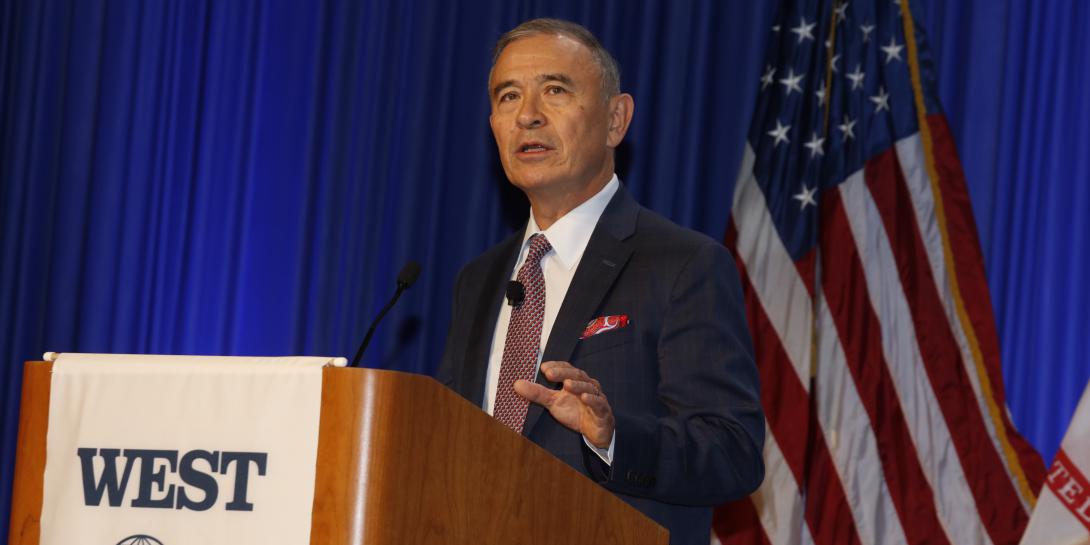Alliances Key to Addressing Rising Pacific Tensions
Alliances are the greatest strength the United States possesses as it confronts increased tensions in the Indo-Pacific region, said a former combatant commander for that area. And they must be buttressed by unambiguous words and actions by the United States before critical actions erupt.
Adm. Harry Harris Jr., USN (Ret.), former commander of U.S. Pacific Command, stated these points to the opening keynote audience at WEST 2022, the conference and exposition hosted by AFCEA International and the U.S. Naval Institute in San Diego February 16-18. The retired admiral, also a former U.S. ambassador to South Korea, extended his perspective across the Indo-Pacific region to include Ukraine. The U.S. faces a host of challenges, he said, and it must be decisive as it works with key allies to counter growing threats.
“Ukraine is hot, the PRC [China] is on the March and North Korea is launching missiles and acting up,” he observed. “America’s single greatest strength is its network of alliances.”
Ukraine is hot, the PRC is on the March, North Korea is launching missiles and acting up. America’s single greatest strength is its network of alliances.—Adm. Harry Harris Jr., USN (Ret.), former commander, U.S. Pacific Command @IFlyP3 #WEST2022
— Bob Ackerman (@rkackerman) February 16, 2022
Adm. Harris singled out North Korea as a focal point for a decisive approach. He stated that leader Kim Jong Un wants four things: sanctions relief, to keep his nuclear weapons, to split the U.S-South Korea alliance and to dominate the peninsula. The United States is firmly committed to its alliance with South Korea, and it should not let North Korea dictate the agenda. “We should not reduce sanctions and exercises to get North Korea to return to the negotiating table,” he stated. “We should consider that after successful negotiations.”
We should not reduce sanctions and exercises to get North Korea to return to the negotiating table. We should consider that after successful negotiations.—Adm. Harry Harris Jr., USN (Ret.), former commander, U.S. Pacific Command @IFlyP3 #WEST2022
— Bob Ackerman (@rkackerman) February 16, 2022
The admiral saved his most forceful message for China relations. The people’s republic is not a trustworthy nation, and it poses a major threat far beyond its immediate vicinity.
“The PRC doesn’t keep its word in international treaties with Hong Kong, Uyghurs,” he declared. “China seeks hegemony in southeast Asia as well as greater Asia and beyond—it wants to set the rules for the world.”
One way of ensuring that China doesn’t resort to military aggression is to be unambiguous about the consequences it faces, Adm. Harris said. For example, the relationship between the United States and Taiwan is deliberately vague. China might invade the island thinking the United States would not respond militarily, which could be a miscalculation leading to a huge death toll.
“It’s important that we be clear to the PRC what would happen to them if they were to forcibly attack Taiwan,” the admiral declared.
It’s important that we be clear to the PRC what would happen to them if they were to forcibly attack Taiwan.—Adm. Harry Harris Jr., USN (Ret.), former commander, U.S. Pacific Command @IFlyP3 #WEST2022
— Bob Ackerman (@rkackerman) February 16, 2022
He offered that the United States should realize what it has in Taiwan. “If we were to mold a country with clay, we would want country that is democratic, that is a friend of the United States, and is a force for good in the world. Well guess what; we have one: it’s called Taiwan,” he stated.
Adm. Harris cited the importance of The Quad; a group of four allies that are banding together to confront challenges on common ground: The United States, Australia, India and Japan. He would like to see them establish a coordination center in the Pacific region where they could work on strategies to counter threats. What’s more, The Quad shouldn’t limit itself to just four nations, he added.
Discussing the Australian government’s recent move to acquire nuclear-powered submarine technology from the United States and the United Kingdom, Adm. Harris said it couldn’t come soon enough. “I cannot wait to see a nuclear submarine under Australian colors somewhere in the Pacific,” he said, adding that it could be done quickly just as the United States put a man on the Moon in less than a decade.




Comments